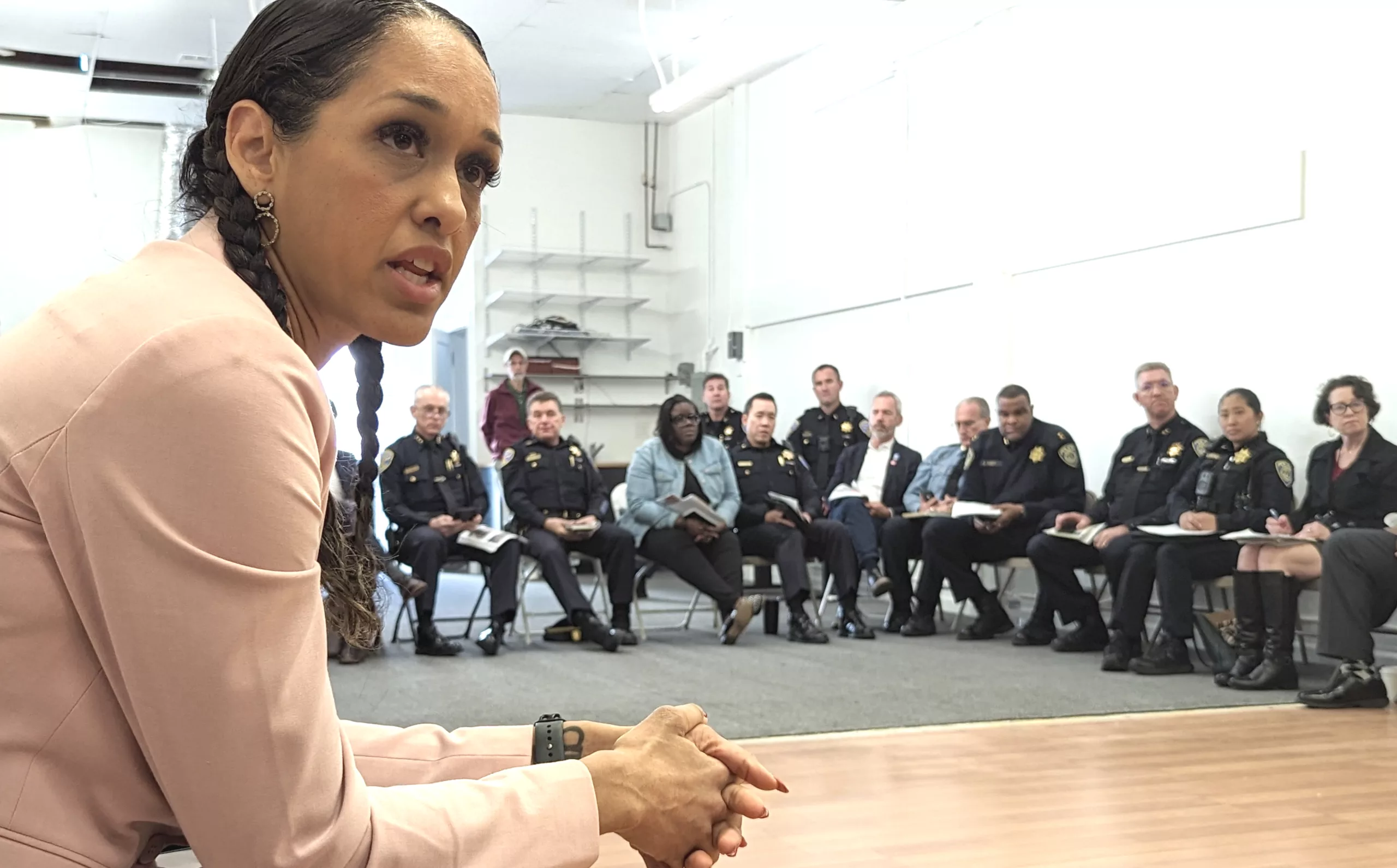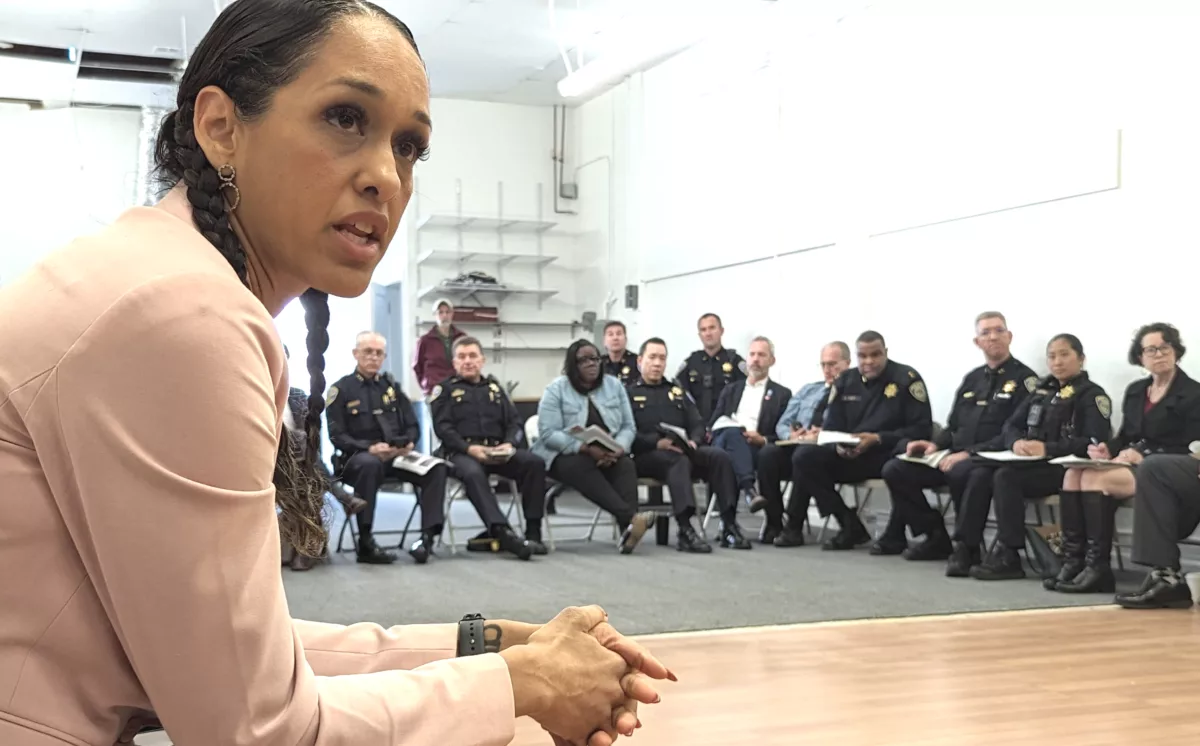Newsletter
Brooke Jenkins’ Voters Got The Dead People They Wanted
Jenkins won’t charge the security guard who shot Banko Brown to death. That’s precisely why San Franciscans elected her in the first place.


Brooke Jenkins’ Voters Got The Dead People They Wanted
by Jerry Iannelli
On May 15, San Francisco District Attorney Brooke Jenkins announced her office would not criminally charge Michael Earl-Wayne Anthony, a private security contractor working at a Walgreens who shot and killed 24-year-old community organizer Banko Brown after Brown allegedly tried to steal from the store. Jenkins’ decision not to prosecute the killing of a trans person who was experiencing homelessness may seem like something of a blunder—at least on paper, one could assume a prosecutor’s highest calling might be bringing those who have killed people to some sort of justice. Openly whiffing on doing so should be a massive and career-ending embarrassment. One might also assume that this would have been a slam-dunk murder case for Jenkins to hang her hat on since Anthony, a civilian, shot an unarmed person to death in plain view of both security cameras and a store full of eyewitnesses.
You would not be alone in thinking these things—on May 15, the San Francisco Chronicle noted that Jenkins had been “inconsistent and reckless in her statements,” untransparent, and unable to handle criticism from the public and fellow lawmakers, and had therefore “fumbled” in the aftermath of the shooting. Those statements are half-right: Throughout her career, Jenkins has developed a reputation for being mendacious, a poor communicator, and a character deeply unliked by quite a lot of people in her general orbit. That she would come off as cold and inhumane in the wake of an unhoused person’s killing is not a surprise to those following her rise in politics.
But, crucially, Brooke Jenkins is no failure. She is doing precisely what she was elected to do. What she was elected to do, however, was not make San Francisco County a more just, righteous, and equal place. She was elected to kill shoplifters.
For those who need a refresher, it’s unusual Jenkins is here in the first place, as she was virtually unknown in city politics less than two years ago. At the time, the city was a year and change into the tenure of one Chesa Boudin, a relatively pedestrian district attorney who, by being perhaps 20 percent less bloodthirsty and jail-happy than the typical American prosecutor, had been tarred by the press as a bong-ripping hippie intent on letting ax-murderers roam the streets and serve school lunches. Boudin, the child of Weather Underground members, won a squeaker of an election in 2019 on a platform of eliminating the usage of cash bail, diverting people from prison for smaller crimes, ending the drug war, and generally attempting to pare back the harms of the criminal legal system.
Importantly, Boudin did not achieve this. The number of drug-sale prosecutions filed by his office, for example, actually increased compared to his predecessor. But Boudin’s semi-radical tenure unfortunately coincided with the COVID-19 pandemic, which exposed the fact that American institutions have crumbled to dust and the nation’s social contract is largely broken. Unemployment, homelessness, and signs of visible poverty spiked just as Americans were looking around and realizing their country was a far more precarious and dangerous place than it once seemed. Rather than admit these facts, the country clambered for scapegoats. A slight increase in crime was blamed not on mass impoverishment and precarity but on people not loving the police enough. The nation’s major retail chains blamed an alleged spike in shoplifting not on the recent world-altering, poverty-creating germ outbreak, but on criminal justice reform policies.
Boudin, with his hippie pedigree and San Francisco mailing address, was an easy target. The press blasted out images of garden-variety shoplifters, handbag thieves, and boarded-up luxury storefronts as examples of Boudin’s allegedly pro-criminal stance. Conservative pundits labeled San Francisco a “failed city” based on little other than the fact that there were seemingly more unhoused people visible during their commutes than before. A wave of so-called “anti-San Francisco” influencers emerged, claiming that dogs were eating meth-infused poop while musing about whether the city should reinstitute public hangings to solve its poverty problems. Another critic of the city unsuccessfully ran for governor on a platform of getting tough on and/or arresting the unhoused. Predictably, real violence followed. A local art gallery owner was filmed spraying an unhoused woman in the face with a hose. Mayor London Breed announced a renewed drug crackdown in the city’s poorest areas. One or more people physically attacked unhoused people, including using high-powered pepper spray designed to ward off bears. The anti-homeless set convinced itself that poverty was something that could be beaten away—and the harder you swung, the safer you’d be.
Jenkins, then, became their champion. In October 2021, she quit her job as a prosecutor within Boudin’s office and publicly supported the growing effort to recall him. Jenkins painted her former boss as weak and unwilling to treat people with the harshness and cruelty the city’s increasingly fed-up wealthy class was demanding. When Boudin’s recall effort—funded largely by conservatives and Silicon Valley executives—succeeded, Mayor London Breed named Jenkins the city’s interim DA. She then won a special election for the role on a tough-on-crime platform that included promises to “hold drug dealers accountable” and dole out “consequences for violent and repeat offenders.” While Jenkins claimed she would continue to honor Boudin’s commitment to legal system reform, activists were far from convinced, given the vocal and public support she’d received from conservative clickbait websites, police, and anti-homeless crusaders.
That she has been the subject of a scathing bar complaint and separate ethics scandal is beside the point. Jenkins was elected to make poor people feel afraid. In letting Banko Brown’s killer walk free, Jenkins announced that it is now open season on the poor and needy in her city, which is what her fans have wanted all along.
ICYMI — from The Appeal
Even though phone calls are free, communications troubles haven’t ended for California prisoners, who have faced months-long email outages, long lines, and other barriers over the past year.
As Phoenix begins to displace approximately 700 people from an encampment, the ACLU of Arizona says the city is violating a court order prohibiting it from violating the rights of the unhoused. The city’s shelter system is nearly at capacity, and many have nowhere to go.
Recent attacks on Jordan Neely and other unhoused people across the US can’t be divorced from the ongoing, concerted political campaign to criminalize homelessness and disappear people living on the streets.
An injunction compels Los Angeles to reinstate a zero cash bail policy for most misdemeanors and nonviolent felonies. In his decision, the judge wrote that “money bail regimes are associated with increased crime.”
In the news
Daniel Penny said he would kill Jordan Neely, an unhoused performer, again. [Juliana Kim / NPR]
Justine Barron’s book, They Killed Freddie Gray: The Anatomy of a Police Brutality Cover-Up, will be released in August and is now available for pre-order. Her investigation reveals that most of what the public was told about the death of Freddie Gray in police custody in Baltimore was untrue. Barron’s book is partly based on a story she published in The Appeal.
Phoenix promised to create 400 new shelter beds by the summer, when temperatures regularly reach 120 degrees. But Axios reporter Jessica Boehm visited the site last week and found it’s just a dirt lot. The beds will not be ready this summer. Last year, 178 unhoused people died of heat-related causes. [Jessica Boehm / Axios]
Prison disciplinary records obtained by The Marshall Project found that over 12 years, New York State tried to fire guards it said abused incarcerated people or hid misconduct in more than 290 cases. Officials succeeded in firing these guards only 10 percent of the time. [Alysia Santo, Joseph Neff, and Tom Meagher / The Marshall Project]
Police arrested Dexter Barry after he argued with his neighbor over who should pay for the WiFi. Seven times, Barry begged for his heart transplant medication. After two days in jail without his medicine, Barry died. [Nichole Manna / The Tributary]
That’s all for this week. As always, feel free to leave us some feedback, and if you want to invest in the future of The Appeal, donate here.
